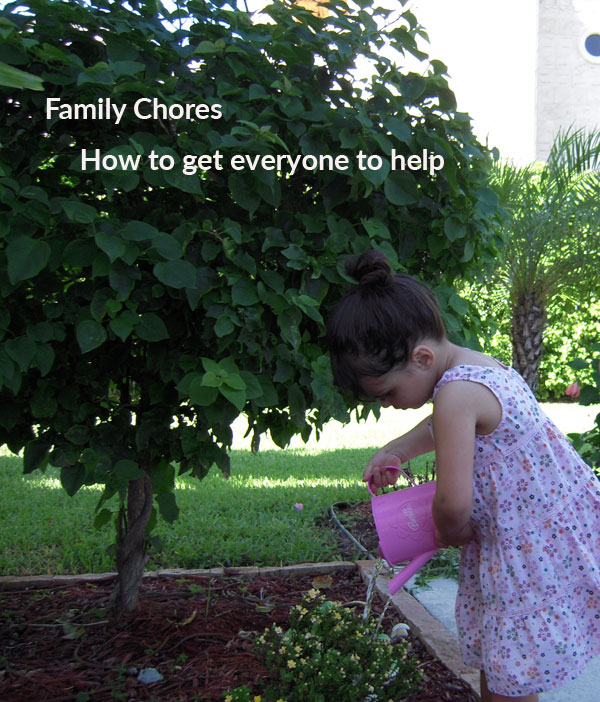Chores: How to Make Them Get Done
 Do you remember when your children were two or three years old, and all they wanted to do was help you with the housework? Whether you were mopping the floor, cooking dinner, scrubbing the toilet or folding laundry, you had a little one wanting to be a helper. You might have accepted the help or diverted them elsewhere (because let’s face it: It’s much faster and easier to get the job done without a preschooler helping!), but you might not have realized at the time that the day would come when those very angelic cherubs would try to refuse to do chores! If you are engaging in battles each day with your kids over chores, or if you would simply like to be able to stop reminding them each day to get their jobs done, read on for some tips that might help:
Do you remember when your children were two or three years old, and all they wanted to do was help you with the housework? Whether you were mopping the floor, cooking dinner, scrubbing the toilet or folding laundry, you had a little one wanting to be a helper. You might have accepted the help or diverted them elsewhere (because let’s face it: It’s much faster and easier to get the job done without a preschooler helping!), but you might not have realized at the time that the day would come when those very angelic cherubs would try to refuse to do chores! If you are engaging in battles each day with your kids over chores, or if you would simply like to be able to stop reminding them each day to get their jobs done, read on for some tips that might help:
-
Try to make it fun. This works better with younger kids, because when they’re older, they catch on to what you are doing. Try setting a timer and challenging them to beat the clock: “Can you get all of the toys out of the living room and put away before the timer goes off?” Another idea is to put on some dance music and have everyone work on their task for a short period of time; 15 minutes is long enough to make headway but not so long that it seems to drag out forever.
-
Add an incentive. If you are planning something fun, such as going to the pool or playing a game, say, “let’s just get these chores done, then we can go!” This way, the emphasis is on the “going” or “doing” part and not the boring chores that they don’t want to do anyway. You could also make a deal with them: If they are done with their bedtime chores before 8:00 pm, then there is time for a 30-minute cartoon (or whatever appeals to your child). If not, then unfortunately, there’s not, but they can try again tomorrow. Money works in our house with the older kids. They have the ability to earn $10 a week. This means that everyday they must do one big job and at least 3 small jobs. I lay out all their options and everyday by 5pm they have to have at least their 4 jobs done to qualify for the money at the end of the week.
-
Remove the nagging. Reminding, encouraging, threatening… it’s all nagging. Make a huge effort to simply stop. Then have natural or logical consequences at the ready for when the jobs aren’t done. Sometimes they’ll be big ones: If you’re not dressed by 7:30, then you will go to school in your pajamas. This might happen, but chances are great that it will happen only one time ever. If the dishes aren’t done after dinner, then you will choose to do them yourself during story time (so there is no story) or maybe during the time that you would be driving the child to ballet practice (so she doesn’t go). In our house, the kids take turns scooping the kitty litter box during the week. Since cats do not like to use a dirty litter box, there is a built-in natural consequence for failing to scoop it each day: There will likely be a bigger mess next to the litter box, which is not as simple to clean! In short, make chores your child’s responsibility to get done, and not your responsibility to remind her about.
-
Switch chores once in a while. Sometimes having a new responsibility is more interesting for kids, and it’s important that they learn how to do various jobs around the house. If your ten-year-old is complaining about having to vacuum each week, then offer to let her switch to folding laundry, taking out the garbage or mopping the kitchen instead.
-
Make sure the chores are age- and ability-appropriate. It’s not fair to expect them to know how to, say, load a dishwasher, if they’ve never been taught. Show them how to do each of the jobs and make sure that they know what to do before expecting them to do it each time. Have expectations that it will be done to the best of their ability, but you might have to relax your standards a bit: It probably won’t be as clean as it would be if you’d done it yourself, but that’s not really the point.
Do you have any tips to share to help other parents who are struggling with the “my kids won’t do chores” blues? What has worked for your family?








